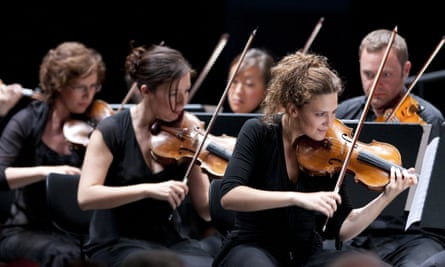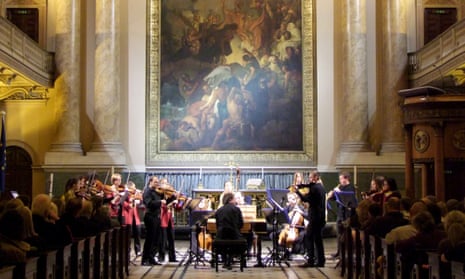One of Britain’s most successful orchestras is moving to Belgium amid fears that its musicians may be among the victims of a post-Brexit crackdown on immigration.
The European Union Baroque Orchestra has been based in Oxfordshire since 1985, but will give its last UK concert in its current form at St John’s Smith Square, London, on 19 May, before moving to Antwerp. The critically acclaimed orchestra, described last month as “brilliant” and “the blooming excitement of youth” by Radio 3’s Sean Rafferty, auditions about 100 students a year, including young British musicians, and chooses between 20 and 25 for intensive training and performance. Alumni have gone on to fill posts in major baroque orchestras around the world.
General manager Emma Wilkinson said that while no one knows what the future may look like, the orchestra decided that moving to Antwerp now would be wise. She fears that the loss of free movement would make life for musicians very difficult: “I do worry that European orchestras will not be inviting talented British musicians to work with them. It will just be too bureaucratically difficult.”
Asked whether future concerts in Britain by the orchestra might be threatened when it was based outside the UK, she replied: “That’s the problem with the uncertainty around this whole issue. We just don’t know.”
Other major orchestras are also weighing up their options. The highly influential European Union Youth Orchestra (EUYO) has been based in London since it began life in 1976. Now it is making contingency plans to move to the continent while it waits to see what life after Brexit might look like.
Marshall Marcus, former head of music at London’s Southbank centre and now chief executive of the EUYO, said the orchestra had already received invitations to move to other EU countries. “For some time we have been forming our plan to be ready to relocate, if and when this becomes necessary. Or indeed simply advantageous,” he said.
“If we do land with a hard Brexit it is really difficult to see how British musicians will be able to continue to take advantage of the opportunities that the EUYO and other EU initiatives have been able to offer generations of European musicians,” he added.
He lists EU worker protections, customs unions, import documents (carnets) for instruments and visa requirements as possible future headaches. “No one I know in the music industry – here or on the continent – wants to have to return to the bad old days of filling in more forms, taking up more time and spending more precious money in order for musicians to be able to perform for audiences on both sides of the channel,” he said.
The EUYO gave birth to another important UK-based cultural institution, the Chamber Orchestra of Europe (COE), founded in 1981 by graduates from the then European Community Youth Orchestra. Since its inception the COE has been widely praised for its performances with many of the world’s greatest conductors, including Claudio Abbado, Bernard Haitink, Nikolaus Harnoncourt, Vladimir Jurowski, Yannick Nézet-Séguin and Sir András Schiff. Headquartered in London, it has no current plans to move but with 85% of its members living on the continent, the orchestra is keeping its options open.

Chairman Peter Readman can see bureaucratic nightmares ahead. “No one knows what the landscape will look like but there is not a chance in hell that it will be better,” he said. “It will require more administrative staff which will add to everybody’s costs in an enterprise that doesn’t make money.”
Timothy Walker, chief executive and artistic director of the London Philharmonic Orchestra, fears for the cultural life of the capital: “London has one of the most vibrant creative communities in the world, full of freelance artists, many of whom come from the EU,” he said. “Expected changes to their right to reside here and work through a points system will unquestionably affect classical music and soundtrack recordings which are a vital part of the arts ecology in the capital.
“Like any performing arts organisation we sometimes have last-minute cancellations and need to fly in conductors or soloists, often as late as the day of a concert. If permits or visas were to be imposed then the ability to move quickly might be jeopardised.
“On the positive side, touring makes up a significant proportion of the LPO’s work and at present the weakening of the pound has increased our competitiveness.”
The director of the Association of British Orchestras, Mark Pemberton, has been lobbying Whitehall about touring: “Imagine a large van full of instruments. Outside the customs union every single instrument on that van would be subject to a carnet, as it is when orchestras tour to the Far East or the US. Currently, we do not know whether a single carnet might cover all EU countries in a tour or whether separate carnets would have to be prepared for each country. It’s a bureaucratic burden that will bring extra cost and delay.”
Like the LPO and other orchestras, opera companies need to fly in substitute performers when illness strikes. “We have to have a quick and efficient work permit system that promotes a diverse and multilingual workforce and enables creative and cultural organisations to access highly specialist skills,” Alex Beard, chief executive of the Royal Opera, wrote recently. “The quality of work on the Royal Opera House stages, for example, is immeasurably enhanced by the ability to draw immediately on a Europe-wide talent pool in the event of sickness.”
The European Opera Centre began life in Manchester in 1997 and moved to Liverpool where it opened the city’s European Capital of Culture year in 2008. It is not contemplating leaving but it may change its name. “We have always gone wider than the EU in offering our help to singers establishing themselves in their careers, but we are now having a debate about whether we should go international and stop calling ourselves European,” said director Kenneth Baird.

Comments (…)
Sign in or create your Guardian account to join the discussion